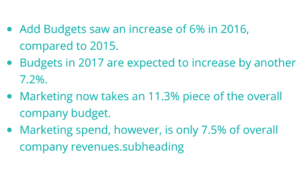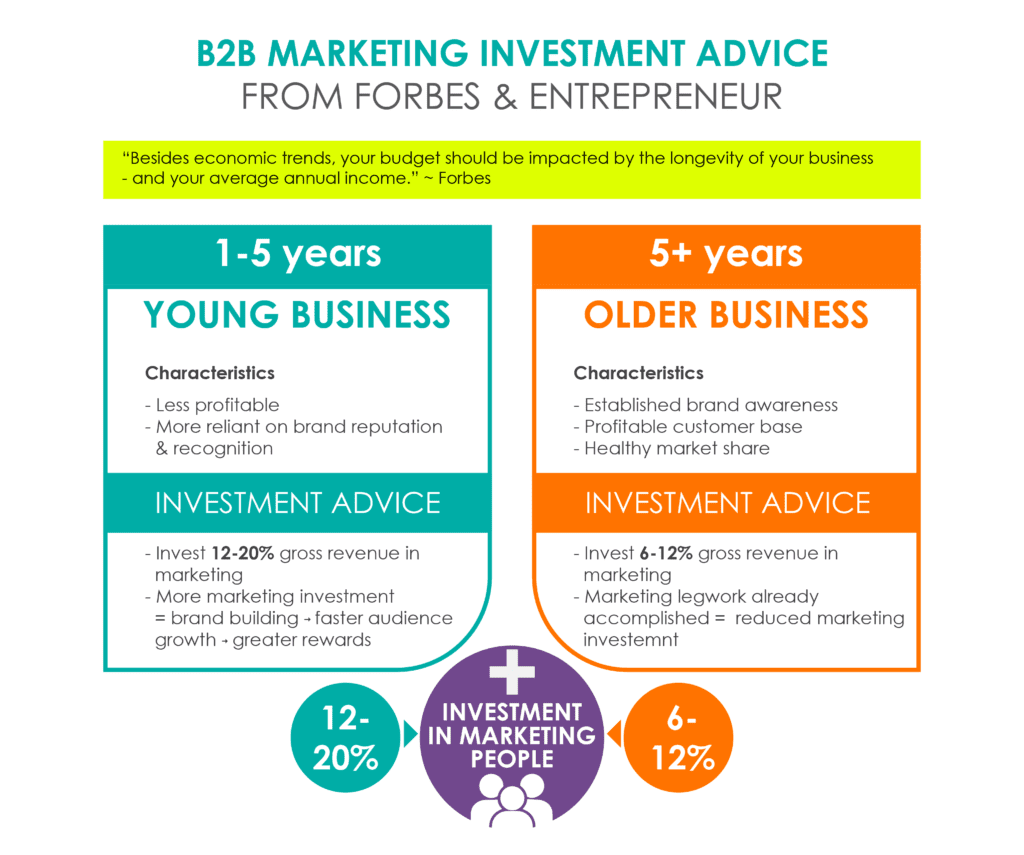Chickens and eggs? Monkeys and peanuts? Just what should my B2B marketing budget be?
Tips to help determine your B2B marketing budget
Whether in a start-up striving to make its mark, a growing business looking to knock out the competition, or an established company set to take over the world, marketing budgeting can cause serious discomfort. Regardless of a business’s maturity, the simple question, “what should my B2B marketing budget be?” raises eyebrows at board-level and incites fear into the marketers responsible for coming up with that magic figure.

 With good reason. Budgeting relies on having sound information to base decisions on and experience in budget planning. It requires foresight and the ability to assess what’s needed to meet future objectives. It might also call for the right mix of of rationale vs. measured risk-taking (fast-growth companies are often the ones that took risks to get there).
With good reason. Budgeting relies on having sound information to base decisions on and experience in budget planning. It requires foresight and the ability to assess what’s needed to meet future objectives. It might also call for the right mix of of rationale vs. measured risk-taking (fast-growth companies are often the ones that took risks to get there).
If you can already demonstrate marketing ROI, outlining how your future strategy (and budget) will continue to support bottom-line growth, and have buy-in from the budget-signers – stop reading right now. Hats off to you, you’re one of a prestigious few in such a strong and enviable position.
Sound like an urban myth (or simply way out of reach right now)? Then here’s some guidance to help shape your budgeting process. We’ve also combined a pool of useful reading sources to support your decision-making.
NB We can’t provide all the answers in a blog post. After all, each business has its own unique situation and growth plans to factor in when deciding how to allocate B2B marketing budget.
Chickens and eggs
You know you need investment to grow and generate profit, but first you need to generate money to fund your marketing. Classic chicken and egg. The pros of investing upfront are you’re more likely to see growth through marketing sooner (provided you’ve the right marketing strategy in place). The downside is the company has to suck up that financial hit and be patient while results unfold. Take the financially cautious route by holding back on B2B marketing investment and it’ll take far longer to realise the true potential of your marketing efforts.
Monkeys and peanuts
Doing things on the cheap, cutting the odd corner is ok… but only on the odd occasion (i.e. you’re seriously short on time, you’re out of options) and when you’re aware of the risks of doing so. Take this approach on a long-term basis and you’ll be getting monkeys for your peanuts. And your marketing performance will reflect that. This is not a route to take when determining how much a company should spend on marketing.
For more insight into how quality investment impacts marketing performance read “Quality is a B2B marketing budget’s best friend”.
Reference points on how to allocate B2B marketing budget
Marketing investment based on B2B state of play
Earlier on this year Katapult blogged about the state of UK B2B marketing investments, revealing that:
Budgeting based on business growth stage and industry
Forbes, Entrepreneur and Deloitte regularly publish insight into marketing investment trends. For a starting point, see their investment advice based on the stage your business is at. Then get a feel for what other businesses in your industry are investing. Use these parameters to start shaping out your own budget.
Source: Gartner CMO Spend Survey 2016-2017 Shows Marketing Budgets Continue to Climb – The Wall Street Journal
You’ll see from across these sources – all of which are credible in their own way – there’s no one magic percentage that appears. It’s down to you and your marketer to weigh up all these factors against your own business objectives and hunger (and ability) to grow.
“Five wise ways to invest your B2B marketing budget” – these tips will help apply further rationale to your budgeting process.
If you’re interested in seeing the breakdown of B2B marketing investment, see the Wall Street’s recent article “Gartner CMO Spend Survey 2016-2017 Shows Marketing Budgets Continue to Climb“. It gives a breakdown, by service driven businesses and product businesses.
More useful steer can be found in here: “Making It Count: How Much of Your Budget Should Really Go To Marketing?” – Business.com, Feb17
For insight into UK B2B marketing budgets check out: “B2B marketing budgets are increasing – Is yours?” – Katapult blog, Feb17.
Looking for B2B marketing investment support?
If you’re in need of some B2B marketing investment support, get in touch. We help guide businesses like yours through the budgeting process each year.


